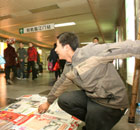China
Chinese Paralympians training for a brighter future
(Xinhua)
Updated: 2010-03-16 14:30
 |
Large Medium Small |
VANCOUVER -- Chinese athletes were prominent in day three of competition at the Winter Paralympic Games on Monday with four cross-country skiers competing in Whistler, Canada.
Du Haitao was the top Chinese in the men's 20 kilometers freestyle, standing race as the 22-year-old Harbin native covered the five km Whistler Paralympic Park course in 55:29.9 to finish seventh in the 19-man field, nearly four minutes behind winner Kirill Mikhaylov of Russia.
Nils-Erik Ulset of Norway captured the silver medal, while Russian Vladimir Kononov, an LW5/7 classified athlete (no arms) like Du, won bronze.
Other China skiers included Zou Dexin in 13th, 7:48.5 off the winning pace, and Cheng Shishuai (59:52.1) in 16th.
| ||||
Luliia Batenkova of the Ukraine finished second, seven seconds back of Burmistrova, and Katarzyna Rogowiec of Poland won bronze.
Du posted a strong finish over the last lap of the Whistler course located 2.5 hours northeast of Vancouver as a final sprint allowed him to move up from ninth after 15 kilometers to sixth.
"I'm happy with my performance, but it wasn't up to my expectations. I thought I could do better," said Du of his Paralympic debut.
"I performed really well but it is not the result I was looking for."
With China now competing in its third Winter Paralympics and yet to win a medal, officials of the China team say there is no pressure on the young team - seven cross-country skiers, standing, in all - to get to the podium. Instead the emphasis is to participate and make progress with each passing event.
But Du, who lost both of his arms as a four-year-old when he was electrocuted while playing with high-voltage wires, is eager to make his mark in disabled Nordic skiing. A former sprinter on the track, his life changed at 18 when he met Wang Xiaobing of the Heilongjiang Disabled Association. "He suggested I could do really well if I switched to cross-country skiing. It was an opportunity that changed my life."
Now a member of the national team, Du and his teammates practice a strict training regime that few able-bodied people could likely endure. Starting their day at 5.30am, the team undertakes a couple of hours of weight training, jogging and stretching exercises before having breakfast. In the winter, they then ski for three hours before lunch, switching to rollerblading in summer. Following a post-meal nap, more skiing and weightlifting is the order, five days a week, 12 months a year. Sunday is a day off.
"Skiing will be my career for the rest of my life so it is something I need to concentrate on and develop this opportunity to wherever it leads," said Du who has so far traveled to Canada on three occasions and Norway once.
"I love travelling around. I'll do this until I can't."
Among those impressed with Du was competitor James Millar, an Australian cross-country skier who was born with a congenital absence of his right forearm.
"Du definitely looks like a strong skier with good technique," said the Australian national team member. "The main drive of power, even with myself, is the legs. You can see especially with the 5/7, no arms, that they have very strong hill climbing skills because their legs are so strong that there is no need for use of their upper-body."
Cheng Shishuai, called "Bruce Lee" by his teammates because of his resemblance to the late martial arts superstar, is also looking for big things from his new career as an elite cross-country skier. After shattering his right arm in a car accident at age four, the muscles in the limb slowly deteriorated to the point where he had no use of his forearm.
After excelling at long-distance running as a teenager, it was suggested he switch to cross-country, a sport where good stamina is a must. In 2006, he was chosen to the national team.
"My goal is to keep doing cross-country skiing, I want to be up with the best, the elite athletes and top the podium at least. I haven't thought about going to university yet, I want to achieve the best possible result in cross-country skiing first before I try anything else.
"My family owed a lot of money when I was young so I hope to improve their economic situation. For myself, I just hope to get better opportunities in future and I can get these by practicing."











